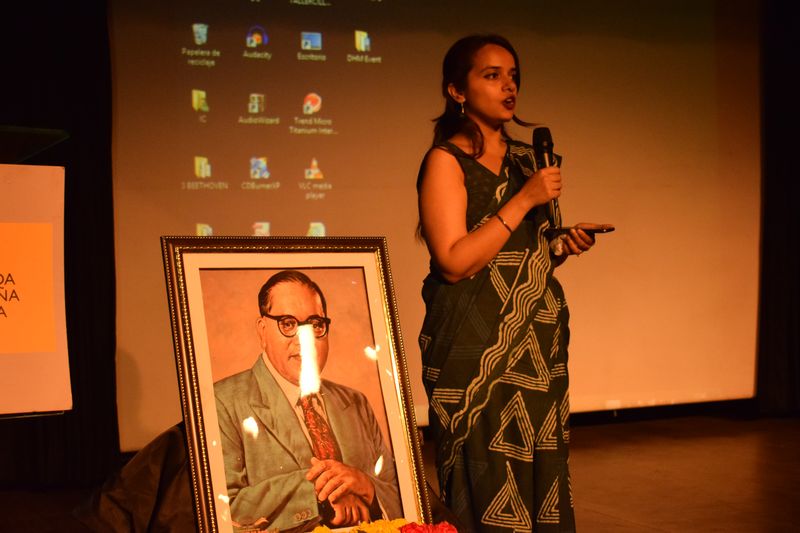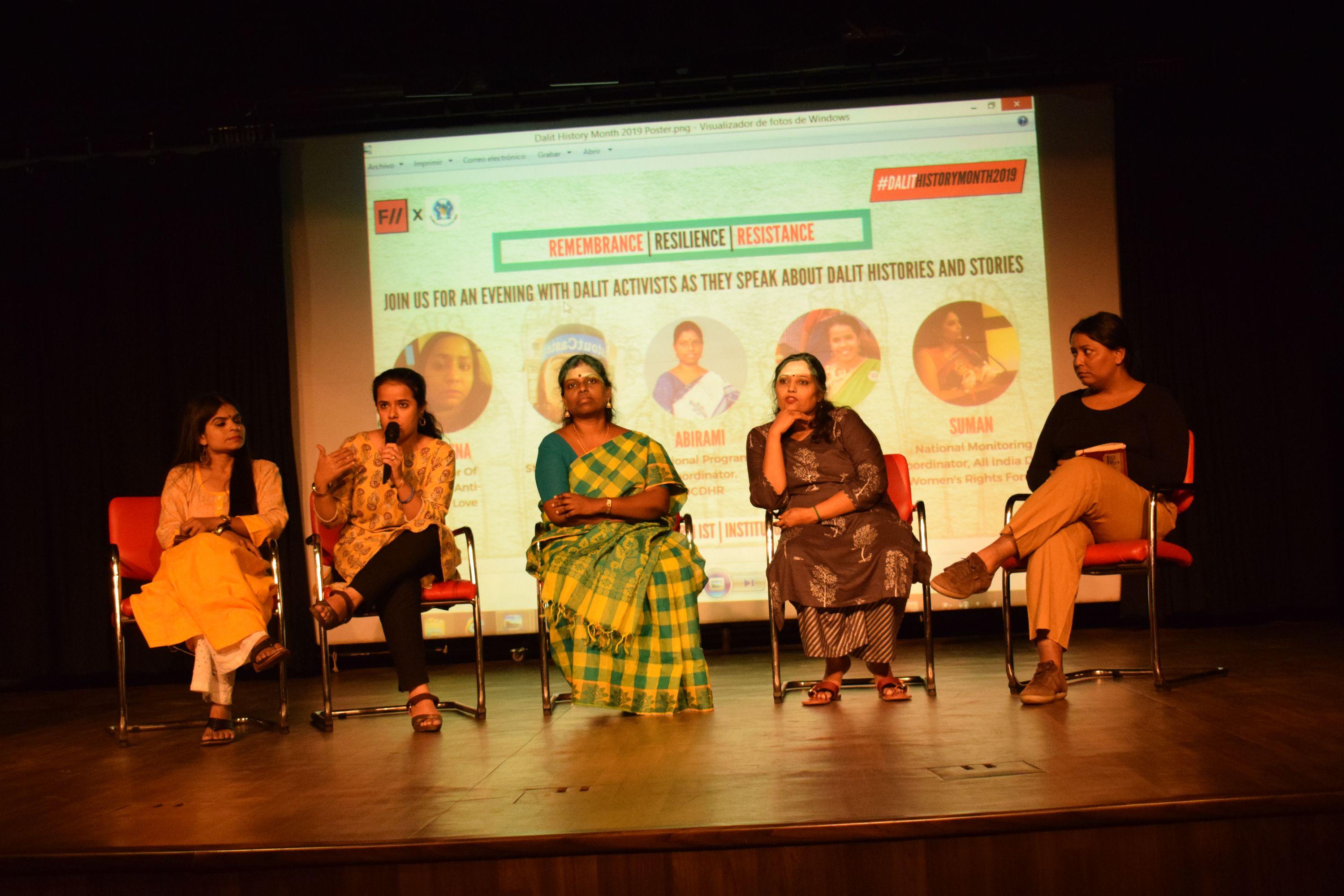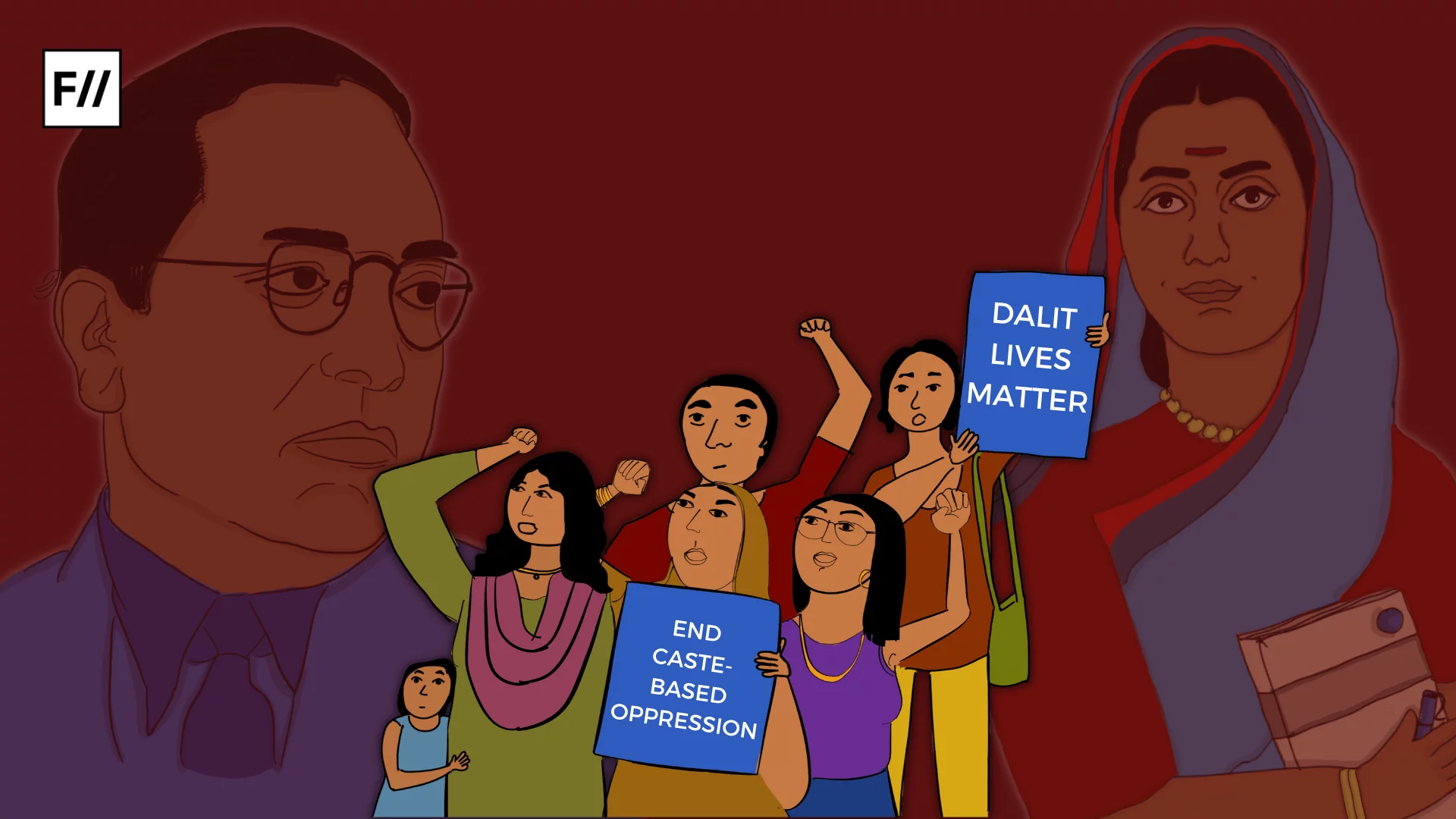On 29 April, 2019, FII and All India Dalit Mahila Adhikar Manch (AIDMAM) aka #DalitWomenFight organized an event to celebrate Dalit History Month. It was an evening of remembrance, resistance and resilience, where we talked about and remembered various Dalit leaders and movements.
The event consisted of FII and #DalitWomenFight talking about our #DalitHistoryMonth campaign with five power talks where our speakers, five Dalit activists, Mohini, Judith Anne Lal, Abirami Jotheeswaran, Suman Devathiya, and Jyotsna Siddharth talked about various aspects of Dalit history. From Babasaheb Ambedkar and women’s rights, to access to water, to Dalit identity, our speakers spoke about the history and present of these pressing topics. The event was organised at Instituto Cervantes, New Delhi. We were pleased to see an enthusiastic and responsive audience.
Japleen from Team FII kickstarted the event with an introduction on FII and why we are celebrating Dalit History Month today. She also introduced the five speakers.

Anju from #DalitWomenFight started the event with an introduction of the work her organisation and Dalit History Month. The event kicked off with our five fantastic speakers garlanding a photo of Babasaheb Ambedkar and cries of Jai Bhim!

Christina Thomas Dhanraj, volunteer at #DalitWomenFight, joined us via a video call and spoke about why she co-founded Dalit History Month. Explaining her vision of Dalit History Month, she said that Dalit community and allies should come together to celebrate the long and rich history of the Dalit community. Pressing on the importance of celebrating Dalit present, with Dalit history she said, “As much as it is important to celebrate Dalit history, it is important to celebrate the Dalit present. It is important to remember not just the atrocities, but also the resilience and resistance in Dalit communities.”
Suman Saurav of Team FII talked about our #DalitHistoryMonth campaign and the work we did around it this entire month. “As a Dalit woman, this campaign helped me learn about the rich history of my community. This month we’ve published many articles, posters & videos profiling Dalit leaders & movements.”
As Christina said, celebrating the Dalit present is just as important. We showcased this video profiling the work of three fantastic @dalitwomenfight activists.
Our first speaker, Mohini a #DalitWomenFight activist, and one of the activists we featured in the above mentioned video, spoke about Babasaheb and his contribution to the women’s rights movement. Talking about her personal experiences she said, “When I was in school, I was never taught about Babasaheb. People would tease me asking “are you really Dalit? Aren’t you all dark skinned? Finding out about Dr. Ambedkar was revolutionary for me.”
She continued, “I have upper caste women friends who scoff at my love for Babasaheb. I request even upper caste people to read Babasaheb — his contributions were not just for the Dalit community.”

Judith Anne Lal, a human rights activist and researcher working with National Campaign On Dalit Human Rights, talked about Dalit identity. She said, “Dalits rejected the term Harijan, that was given by Gandhi, and embraced the term Dalit. Someone from outside the community cannot dictate how we identify. It was an expression of empowerment and identity that was our own.”

Explaining how caste system is still alive she said, “People think that caste is something that existed in the 5th or 6th century. We see how Dalit women are exploited even when they go outside to relieve themselves in villages. We see honour killings happen everyday. Caste is very much alive.”
Our next speaker, Abirami Jotheeswaran, a Dalit human rights activist working as a National Program Coordinator with NCDHR, spoke about atrocities against Dalit. She talked about Mirchpur Massacre, where 300-400 Jat upper caste people set an entire Dalit basti ablaze, leading to the deaths of a father and daughter and the damage of the entire basti. “I was part of a fact finding committee to find out what actually happened. What seemed like impromptu mob violence was actually a pre-planned attack.”

She continued, “The violence took place in 2010, and the Dalits were moved to a ‘temporary’ shelter. Almost a decade later, the community still hasn’t been rehabilitated. Their economic growth and relative prosperity went ten steps back due to this atrocity.” “This is just one incident of many. In 2017, there were 40,770 registered atrocities against Dalits in India. But it important that just as the atrocities won’t stop, we will not stop fighting for justice either. Jai Bhim!“
Suman Devathiya, our next speaker, who works as a National Monitoring Coordinator with All India Dalit Women’s Rights Forum, spoke about the Dalit community and access to water. Talking about Mahad Satyagraha she said, “In 1925, Babasaheb passed a regulation that no public utility should be barred to Dalits. But it was flouted by upper caste people in the area. In 1927, Dr. Ambedkar led the #MahadSatyagraha, where thousands of Dalits marched to drink from the public tank in Mahad.”
Explaining how the problem of access to water still exists to this date she said, “Even today, there are public tanks and lakes where even animals are allowed to drink from, but Dalits are still barred from drinking from them.” Calling for more action from the upper-caste feminist movement she said, “The upper-caste feminist movement has absolutely ignored these atrocities. Nobody has spoken out about these issues. We talk about allyship, but where is the action?“

Jyotsna Siddharth, our final speaker of the evening, who is the founder of Project Anti Caste, Love, spoke about Dalit women leaders. “We have key lessons to learn from these women. They compelled the State to listen to them — women from marginalized castes. Phoolan Devi wasn’t caught by the govt until she surrendered. Bhanwari Devi’s case led to the Act against sexual harassment at the workplace.” Pressing on the importance of Dalit feminism and allyship she said, “It’s important in these times to speak out against discrimination together, and not just in our own social bubbles. Allyship is important. Dalit feminism has always existed, and I think the mainstream movement has a lot to learn from its strength & resilience.”

The event concluded with an interactive Q&A session where the speakers answered questions posed by the audience. They talked about the annihilation of the caste system and how it should not be the sole responsibility of the Dalit community to fight for it. “The burden of fighting caste cannot be on Dalits alone. Everyone needs to join the movement and fight against it“, said Jyotsna and Abirami.

This was indeed a very heartwarming experience for FII and we can’t wait to organise more events like this. If you missed the event, fret not, watch the entire event on Facebook Live here.
Featured Image Credit: Srishti Kapil for FII
About the author(s)
Feminism In India is an award-winning digital intersectional feminist media organisation to learn, educate and develop a feminist sensibility and unravel the F-word among the youth in India.




